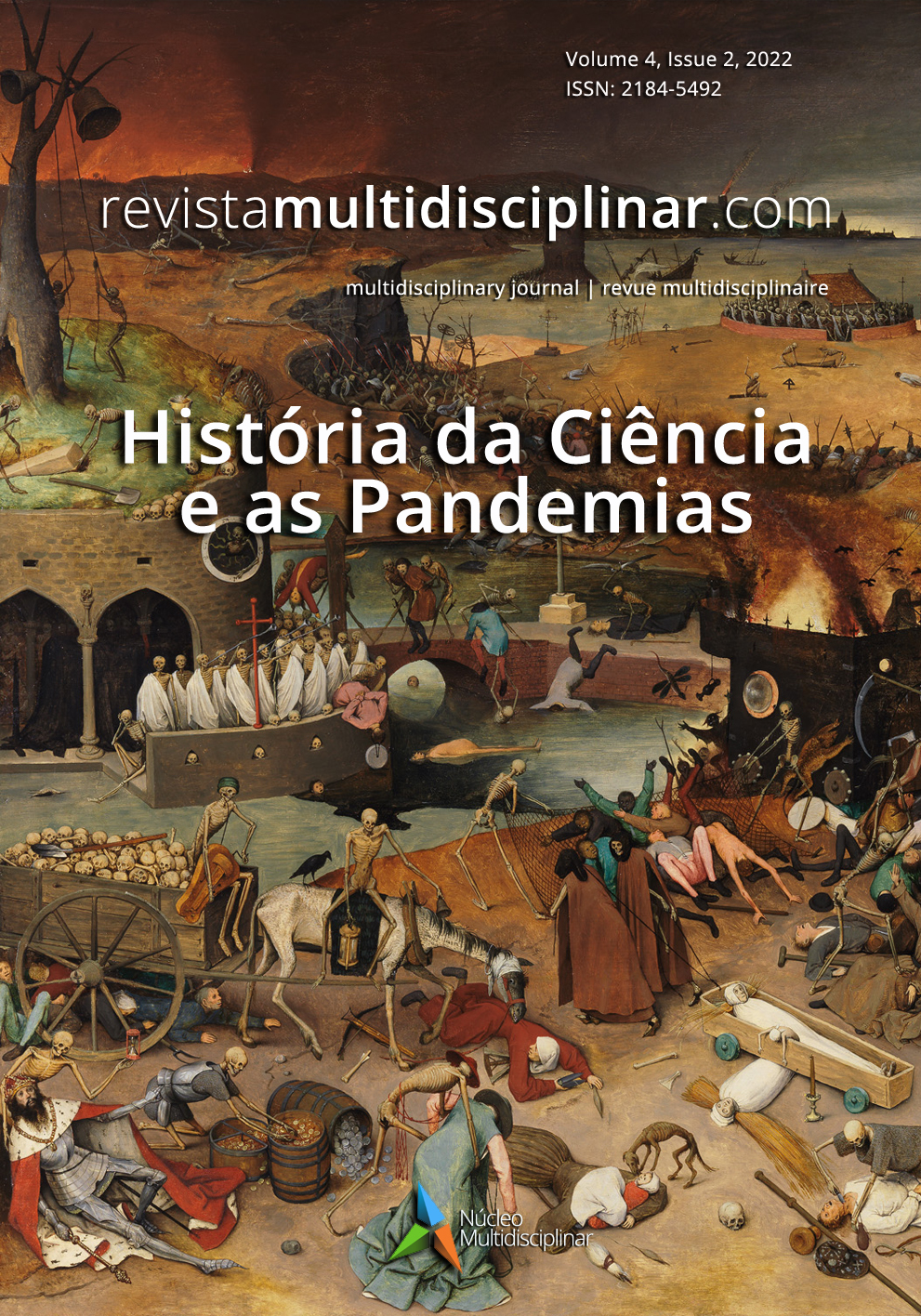Viruses are "unique" and challenge the paradigms of science
DOI:
https://doi.org/10.23882/rmd.22094Keywords:
viruses, paradigms, science, ecology, virosphereAbstract
The history of the progress of scientific knowledge of viruses demonstrates that the tendency of researchers to get caught up in specific paradigms and theories about the causes of diseases does not allow them to see the threats of known and unknown pathogens (Honigsbaum, 2021). This is the case, for example, of the “germ theory” of the disease, presented by the German bacteriologist Robert Koch and his French colleague Louis Pasteur, in the 1880s. The bacteriological paradigm of human flu, when defended by Richard Pfeiffer in 1892, delayed the understanding of its viral etiology for decades. Unfortunately, it was rare the man of science who dared challenge the authority of Koch and his disciples.
In this article, we intended to contribute to the elaboration of a scientific image of viruses, confronting it, whenever necessary, with the ontology of everyday life. For Dennett (2021), the scientific image is something that has to be learned at school, and most people acquire a superficial knowledge of it. Nevertheless, in our relationship with viruses, we have to learn what “things” to remove from our ontology of everyday life and what new categories to introduce to create an ontology of the scientific image of viruses, underpinning our understanding of these unique entities that challenge scientific paradigms. It is in this context that the approach to the process of production of scientific knowledge has been identified as being of fundamental importance to understanding Science and Virology has a historically contextualized human activity.
References
Agut, H. (2007). La multiplication des virus. Pour La Science, 55, 14-19.
Aires, L. M. (2020). Vírus, Bactérias e Humanos. Ciência e Histórias de uma Coabitação Atribulada. Lisboa: Edições Sílabo.
Baltimore, D. (1970). Viral RNA-dependent DNA Polymerase: RNA-dependent DNA Polymerase in Virions of RNA Tumour Viruses. Nature, 226, 1209-1211.
Calafate, L. C. (1984). Estudo das Implicações da Epistemologia da Ciência na Epistemologia Escolar. (Provas de aptidão pedagógica e capacidade científica, não publicadas). Faculdade de Ciências da Universidade do Porto, Portugal.
Calafate, S. (2021). Vírus de laboratório. Rev. Ciência Elem., V9(2), 031
Chastel, C. (2007). La découverte d’un nouveau monde. Pour La Science, 55, 8-13.
Dennett, D. C. (2021). Das bactérias a Bach e vice-versa. A evolução das mentes. Lisboa: Edições 70.
Diamond, J. (2002). Armas, Germes e Aço. Os Destinos das Sociedades Humanas. Relógio D’Água Editores.
Du, S., Qin, F., Zhang, Z., Tian, Z., Yang, M., Liu, X., Zhao, G., Xia, Q., & Zhao, Y. (2021). Genomic diversity, life strategies and ecology of marine HTVC010P-type pelagiphages. Microbial Genomics, 7, 000596
Dulbecco, R. (1995). “Howard M. Temin, 10 December 1934 – 9 February 1994”. Biographical Memoirs of Fellows of the Royal Society, 41(4), 471-80.
Fuhrman, J. A. (1999). Marine viruses and their biogeochemical and ecological effects. Nature, 399, 541-548.
Honigsbaum, M. (2021). O Século das Pandemias. Amadora: Vogais.
Kuhn, T. (1978). Segundos Pensamentos Sobre Paradigmas. Madrid: Tecnos.
Kuhn, T. (1979). A Função do Dogma na Investigação Científica. In M.M. Carrilho (Ed.) História e Prática das Ciências. Lisboa: A Regra do Jogo.
Kuhn, T. (1980). La estrutura de las revoluciones científicas. Madrid: Fondo de Cultura Económica.
Kupiec, J.-J. (1995). Histoire de vírus, de gènes et de chercheurs. Science et Vie, 193, 56-65.
La Scola, B., Audic, S, Robert, C., Jungang, L., de Lamberie, X., Drancourt, M., Birtles, R., Claverie, J.-M., & Raoult, D. (2003). A Giant Virus in Amoebae. Science, 299, 2033.
Marçal, D., & Fiolhais, C. (2020). Apanhados pelo Vírus. Lisboa: Gradiva.
Maréchal, V. (2007). Virus en emboscade dans l’organisme. Pour La Science, 55, 66-71.
May, R. M., & Anderson, R. M. (1983). Epidemiology and genetics in the coevolution of parasites and hosts. Proc. R. Soc. London, 219, 281-313.
Maynard Smith, J., & Szathmáry, E. (2007). As Origens da Vida. Do Nascimento da Vida às Origens da Linguagem. Lisboa: Gradiva.
Miller, J. (2021). A Vacina: A Inovação de uma Era no combate à COVID-19. Lisboa: ACTUAL.
Misasi, J., & Sullivan, N.J. (2014). Camouflage and Misdirection: The Full-On Assault of Ebola Virus Disease. Cell, 159(3), 477-486.
Oreskes, N. (2021). Porque confiar na ciência? Lisboa: Gradiva.
Parreira, R., & Piedade, J. (2016). Vírus. In W.F.C. Ferreira, J.C.F. de Sousa and N. Lima (Eds.), Microbiologia (pp. 110-129). Lisboa: Lidel.
Philippe, N., Legendre, M., Doutre, G., Couté, Y., Poirot, O., Lescot, M., Arslan, D., Seltzer, V., Bertaux, L., & Bruley, Ch. (2013). Pandoraviruses: Amoeba Viruses with Genomes Up to 2.5 Mb Reaching That of parasitic Eukariotes. Science, 341, 281-286.
Pilorge, T. (1995). Une brève histoire de l’infiniment Petit. Science et Vie, 193: 4-9.
Popper, K. (1978). La Logique de la Découverte Scientifique. Paris: Payout.
Pracontal, M. (1995). Les Gendarmes d’Atlanta contre le vírus. Science et Vie, 193, 80-89.
Sonigo, P. (1995). Durer: l’unique raison d’être des Vírus. Science & Vie, 193, 66-74.
Sullivan, M. B., Weitz, J. S., & Wilhelm, S. (2016). Viral ecology comes of age. Environmental Microbiology Reports, 9(1), 33-35.
Tavares, M. (2007). Gripe. Matosinhos: QuidNovi.
Temin, H. M., & Mituzani, S. (1970). RNA-dependent DNA Polymerase in Virions of Rous Sarcoma Virus. Nature, 226, 1211-1213.
Villarreal, L. (2007). Les vírus sont-ils vivants? Pour La Science, 55, 20-24.
Villarreal, L. (2016). Viruses and the placenta: the essential vírus first view. APMIS, 124, 20-30.
Wilhelm, S. W., & Suttle, C. A. (1999). Viruses and nutrient cycles in the sea-viruses play critical roles in the structure and function of aquatic food webs. Bioscience, 49, 781-788.
Wilson, E. O. (2019). Da Terra Metade. A Luta do Nosso Planeta pela Vida. Porto: Arte E Ciência.
Whitfield, P. (1994). História Natural da Evolução. Lisboa: Verbo.
Zimmer, C. (2021). Um Planeta de Vírus. Porto Salvo: Desassossego.
Published
How to Cite
Issue
Section
License
Copyright (c) 2022 Luís Calafate

This work is licensed under a Creative Commons Attribution-NonCommercial 4.0 International License.









